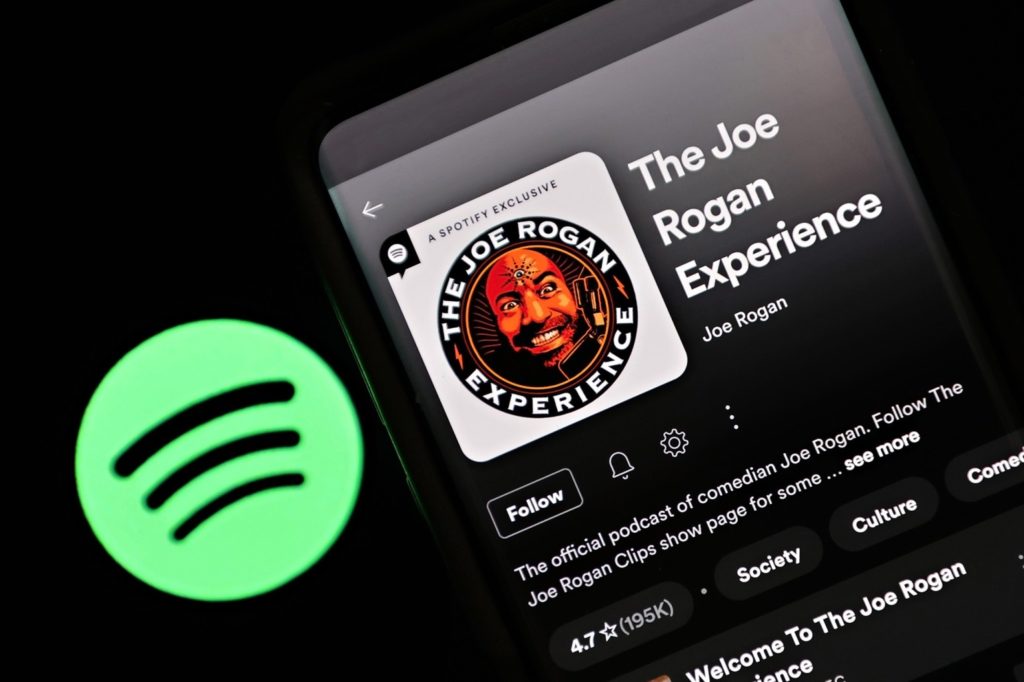By Kate McBride || Arts & Leisure Editor
In 1951, at the mere age of five years old, Neil Young became partially paralyzed from contracting polio. Joni Mitchell was just nine years old when she was hospitalized with the same disease. These two have quite a bit in common: aside from the fact they both were drastically affected by polio at an extremely young age, they both grew up to be iconic singers and they both have decided to champion against the spread of anti-vaccine propaganda. Mitchell and Young, as well as a number of other notable musicians and podcasters, have withdrawn their content from Spotify—the platform home to Joe Rogan’s podcast, The Joe Rogan Experience.
Joe Rogan is a polarizing fellow. Revered by millions for his unconventional, resist-the-establishment commentary, he is known to have guests from all different backgrounds. Elon Musk, Robert Downey Jr., Bill Burr, Jordan Peterson, Mike Tyson—you name the celebrity, it wouldn’t be shocking if they had made their way into Joe Rogan’s studio in Woodland Hills, Los Angeles. Each episode is long and discursive, as Joe allows his stream-of-consciousness to take the wheel. He is very open about the fact that he does minimal preparation for each episode:
“These podcasts are very strange because they’re just conversations, and oftentimes I have no idea what I’m going to talk about until I sit down and talk to people,” Rogan said in a video he posted to Instagram on January 30th.
“That’s why some of my ideas are not that prepared or fleshed out—because I’m literally having them in real-time. But I do my best, and they’re just conversations…It’s a strange responsibility to have this many viewers and listeners. It’s very strange and it’s nothing that I prepared for, and it’s nothing that I ever anticipated.”
Joe certainly is right about one thing—he has a responsibility. With a large platform such as his, it is not only good practice—but absolutely necessary—to be mindful about the messages that can be drawn from his (and his guests’) rhetoric. Rogan has a history of being a lightning rod for controversy, but this latest wave of backlash is born out of anti-vaccine misinformation. Robert Malone, a vaccine scientist who has garnered mass attention for his anti-coronavirus vaccine rhetoric, used his spotlight on Rogan’s podcast to argue that Americans are trapped in a “mass formation psychosis,” comparing the Nazi’s rise to power to the country’s efforts to get as many people as possible vaccinated for COVID-19:
“When you have a society that has become decoupled from each other and has free-floating anxiety, in a sense that things don’t make sense, we can’t understand it. And then their attention gets focused by a leader or series of events on one small point, just like hypnosis, they literally become hypnotized and can be led anywhere,” Malone said.
While this may have just been a “conversation” in the eyes of Joe Rogan, putting out harmful, blatantly outrageous ideals like these have real consequences. There is a difference between censorship and curation, and many critics argue that Spotify has a responsibility to curate its content in a manner that does not promote the spread of dangerous misinformation.

Daniel Ek, CEO of Spotify, openly came to the defense of Joe Rogan and his podcast:
“Obviously with 11 million creators there’s a lot of discourse, there’s a lot of things here I don’t agree with, a lot of people might even find offensive, too,” Ek said in a tense town hall-style meeting. “And yeah, that’s part of being a platform.”
Singer-songwriter India Arie joined Young and Mitchell in boycotting Spotify.
“I find Joe Rogan problematic for reasons other than COVID interviews […] For me it’s also his language around race,” she said in an Instagram post on January 31st.
She subsequently posted a compilation video of Rogan uttering a racial slur on multiple occasions. In yet another response video on Instagram, Joe attempted to own up to his multitude of mistakes:
“I know that to most people, there is no context where a white person is ever allowed to say that word, never mind publicly on a podcast, and I agree with that now […] it’s not my word to use.” He went on to say, “I never used it to be racist, because I’m not racist, but whenever you’re in a situation where you have to say ‘I’m not racist,’ you fucked up—and I clearly have fucked up.”
As of Saturday morning, Spotify has quietly removed over 70 episodes of The Joe Rogan Experience from its platform. None of the episodes have anything to do with COVID-19 misinformation.
Sophomore Kate McBride is the Arts and Leisure Editor. Her email is kmcbride@fandm.edu.
